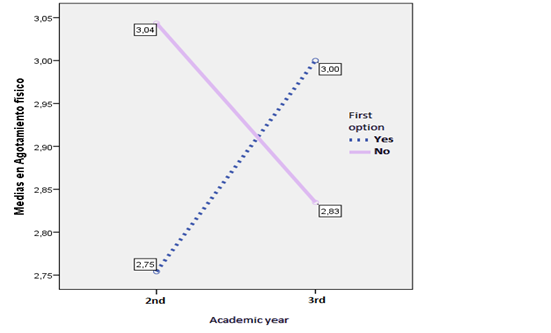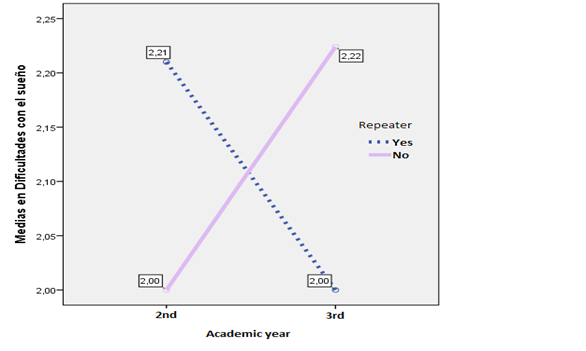Abstract
Through the present longitudinal study, the development in the perception of stress responses during the completion of degree studies is intended to know, as well as the influence of socio-educational variables of the student in said process. A total of 264 students (58.2% men, 41.8% women) enrolled in the Degree of Physiotherapy of the University of Vigo (Spain) in the academic years from 2010/2011 to 2014/2015 participated voluntarily in the study. In order to obtain this data, a paper format questionnaire was used, with the stress response subscale (RCEA) included in the academic stress questionnaire. The socio-educational variables of Way and Mark of access, First degree option, Course repetition and Level of studies of the mother and father have been considered. The results show a slight influence of the socio-educational variables on the perception of stress symptoms only in the particular case of women. There is a significant relationship observed in the fact that those female students who are repeaters or who have enrolled in the degree as a first option, increase the perception of physical exhaustion and difficulties with sleep, unlike their classmates, who maintain their values stable.
Keywords: Academic stresshigher educationsocio-educational variablesuniversity students
Introduction
Students modify the perception of stress responses during their studies
An interesting research line has focused its interest in the analysis of the adjustment capacity of university students. This process of adjustment can lead to stress, implying for some a maladaptive emotional experience and for others an exciting moment of personal change and development due to the positive confrontation of the situation (Extremera, Rey, & Durán, 2005).
Students modify their stress responses according to certain socio-educational characteristics
To explain the fact of this variability in the same academic situation, Martín (2007) specifies that there are several factors to be taken into account in this process of emergence of stress responses, such as certain personal variables, the characteristics of the social environment and certain institutional variables that, in a different way, act as stressors or buffers of the pernicious effects of stress on health and personal well-being, which negatively or positively affect university students in their academic work.
Problem Statement
Knowing how socio-educational factors influence the perception of stress responses
In this sense, the study of socio-educational factors that protect students from the negative consequences of the teaching-learning process is important as it helps to understand the mechanisms by which these events generate adaptive problems (Enríquez, 2011).
Research Questions
The students modify their perception of responses according to their socio-educational characteristics during the degree.
Socio-educational variables determine the development of stress responses
The higher the educational level of the parents, in particular the one of the mother, the higher academic demands by their mothers they will have and consequently the higher levels of stress (Marchesi, 2000). The fact of combining studies and work or having other obligations besides studying is also related to a greater presence of stress, as they are tasks that leave less time to study. However, studies such as Barraza (2008) could not demonstrate that these events could in any way condition stress suffering.
Purpose of the Study
Socio-educational variables modulate or facilitate the development of stress responses
We intend to reach a more exhaustive knowledge of the reactions at health level that stress causes in students, which may be conditioned by socio-educational characteristics that act as facilitators or modulators of stress.
Research Methods
Participants
The study sample consists of 264 students enrolled in the Degree of Physiotherapy of the University of Vigo (the only degree in health sciences of the University of Vigo) between the academic years of 2010/2011 and 2014/2015, who wanted voluntarily be part of the research, previously being informed in what the investigation consisted, including a 66.33% of the 398 possible students.
Measurement of the variables
A longitudinal study was carried out between 2010 and 2015. The technique used to obtain the data was a paper format questionnaire distributed among the students.
The measured variables were physical exhaustion, difficulties with sleep, irascibility, negative thoughts and physical agitation through the stress response scale (RCEA) that forms part of the Academic Stress Questionnaire (CEA), elaborated by Cabanach, Valle, Rodríguez, & Piñeiro (2008) and Cabanach, Valle, Rodríguez, Piñeiro, & González (2010), and which is composed of a total of 22 items with which it is intended to measure symptoms related to cognitive, behavioural, affective and somatic components linked to academic stress. The student has to answer to what extent he reports the appearance of symptoms on a scale between 1 and 5, in which 1 is "never" and 5 is "always".
In addition, socio-educational variables were taken into account as:
Data analyse
The computer application SPSS-22 was used for the statistical analysis (IBM Corp. launched 2013. IBM SPSS Statistics v 22.0 for Windows, Armonk, NY, USA).
The statistical procedure of repeated measures Anova MR was used for the analysis of the variance of repeated measures in an intragroup factor in order to compare the average between the courses.
The internal consistency of the scale was evaluated by Cronbach's alpha. (0.868).
Findings
Only significant effects for women have been found in the change between 2nd and 3rd year and in only 2 of these factors. One of them is the
Enrolling at the First degree option influences on physical exhaustion
The significance is due to the fact that in 2nd year, those who did not choose Physiotherapy as the first option score higher, but in 3rd year the situation is inverted and those who did choose it are also those who score more (Figure
While in 2nd year the non-repeaters score higher, in 3rd year the order is inverted and the repeaters are the ones that score higher. For their part, for men (Table


Conclusion
The effect of socio-educational factors on the development of stress symptoms is summarized around the fact that the students whose first option was this degree and who are repeaters, suffer an increase of physical exhaustion and difficulties with sleep respectively. But the fact of not choosing it as the first option or not being a repeater does not exert a positive influence on these symptoms.
Longitudinal studies are necessary to observe the stress evolution of the students. The study of socio-educational factors is very important to take a global perspective into the higher education and to know students much better.
In a cross-sectional study conducted by Soto (2011) it was observed that there are socio-educational factors that modulate stress symptoms such as the
References
- Barraza, A. (2008). El estrés académico en alumnos de maestría y sus variables moduladoras: un diseño de diferencia de grupos. Avances en psicología latinoamericana, 26(2), 270-289.
- Cabanach, R. G., Valle, A., Rodríguez, S., & Piñeiro, I. (2008). Respuesta de estrés en contextos universitarios: construcción de una escala de medida. Oviedo: V Congreso internacional de Psicología y Educación: los retos de futuro.
- Cabanach, R. G., Valle, A., Rodríguez, S., Piñeiro, I., & González, P. (2010). Las creencias motivacionales como protector del estrés en estudiantes universitarios. Eur. J. Educ. Psychol., 3(1), 75–87.
- Enríquez, H.A. (2011). Inteligencia Emocional Plena: Hacia un Programa de Regulación Emocional Basado en la Conciencia Plena. Universidad de Málaga, Facultad de Psicología.
- Extremera, N., Rey, L., & Durán, M.A. (2005). Burnout y engagement: análisis diferencial del potencial predictivo de los recursos individuales entre estudiantes y profesores. Psicología de las organizaciones, del trabajo y de los recursos humanos y de la salud. Madrid: Biblioteca Nueva.
- Marchesi, A. (2000). Un sistema de indicadores de desigualdad educativa. Revista Iberoamericana de Educación, 23, 135– 64.
- Martín, I. M. (2007). Estrés académico en estudiantes universitarios. Apuntes de Psicología, 25(1), 87–99.
- Soto, M. (2011). Influencia de las variables sociodemográficas-educativas sobre el estrés, engagement y rendimiento académico en estudiantes de grado de fisioterapia. Universidad de Málaga, Facultad de Ciencias de la Salud.
Copyright information

This work is licensed under a Creative Commons Attribution-NonCommercial-NoDerivatives 4.0 International License.
About this article
Publication Date
09 April 2019
Article Doi
eBook ISBN
978-1-80296-059-4
Publisher
Future Academy
Volume
60
Print ISBN (optional)
-
Edition Number
1st Edition
Pages
1-1062
Subjects
Multicultural education, education, personal health, public health, social discrimination,social inequality
Cite this article as:
Caeiro, E. M. L., González, Y. G., Carrera, I. D. C., & González, M. S. (2019). Influence Of Socio-Educational Variables On Stress Responses. In E. Soriano, C. Sleeter, M. Antonia Casanova, R. M. Zapata, & V. C. Cala (Eds.), The Value of Education and Health for a Global, Transcultural World, vol 60. European Proceedings of Social and Behavioural Sciences (pp. 362-367). Future Academy. https://doi.org/10.15405/epsbs.2019.04.02.46

